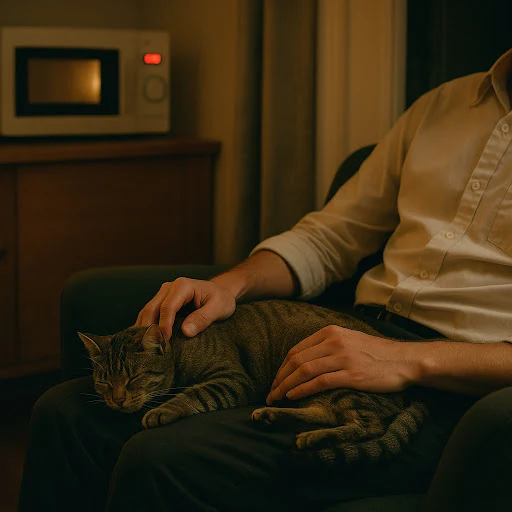There’s a particular kind of weariness that follows me home from the clinic — not brute exhaustion, but the quiet fatigue that comes from focus and care. The sort born of holding space for others, of listening more with the body than the voice. A good sort of tired, but tired all the same.
And then — the cat.
Not in welcome, not in haste. Simply there. Somewhere between the hallway and the armchair, between the soft whirr of the microwave warming supper and the window. A presence. A still point. The day begins to settle.
There is no need to explain oneself. No account to give. The cat does not demand. It watches. It knows — not all, but enough. Enough to follow, silently, as I move through the small rituals of arrival. Shirt off, water on, socks to the floor. And there they are, as though summoned not by command but by understanding.
They don’t follow in the usual sense. They anticipate. They appear at the precise moment the body yields to stillness — as I lower myself into the chair, they arrive. No fanfare, no flourish. Only what’s required: a stretch, a lean, a pause beside me.
And I smile — the quiet sort, not for show.
In their company, I am not Doctor. Not the one with the steady hands, the measured voice, the notes half-finished in my coat pocket. I am simply here. And so are they. No explanation, no need. Their presence says: the work is done, for now.
They bring no answers. And yet, somehow, fewer questions remain.
The company of a cat is not comfort as such — it’s something steadier, less sentimental. It’s an unspoken agreement. They ask nothing, and in return offer that rarest of gifts: undemanding presence. They are there, and that is enough.
As they curl beside me — eyes half-closed, tail twitching lightly in some private dream — I feel it again. That strange, unshowy joy. Not jubilant, not bright — but deep. The joy of having arrived, without noise or effort, into the quiet certainty of where I am meant to be.
And that, really, is home.


Comments
Post a Comment